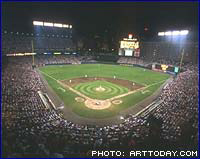Bond's Homerun Record Is Discredited by Many

Steroid allegations hound Giants slugger
by Mark Zurlo and Chris Warner
 Related Links |
Former homerun king Hank Aaron is arguably one of the most respected and least controversial baseball stars of all time, but the same can not be said of the man who has replaced him atop the all-time homerun list, Barry Bonds.
Bonds's career achievements, while staggering, have been widely criticized by fans and fellow players alike who believe that Bonds's numbers are not the result of hard work and talent, but of years of heavy steroid use. Such accusations are not unfounded; Bonds has put up the best numbers of his career at an age when many players are pondering retirement or working on their golf swings.
Late 30s Power Surge
While Bonds played 14 MVP-caliber seasons from 1986 to 2000, it was during 2000, at age 36, that he began a string of five consecutive seasons in which his offensive production rivaled the greatest seasons by any player in baseball. After never having hit 50 homeruns in a single season, Bonds broke Mark McGwire's single season record by smashing 73 homers in 2001. In 2004, at the age of 40, Bonds led the league in hitting with a .362 average, and he hit 45 homeruns.
Suspicion of Bonds Steroid Use Grows
In June 2002, a Sports Illustrated article by Tom Verducci, titled "Totally Juiced," detailed baseball's massive steroid problem and pushed the issue into the nation's conscience for the first time. Bonds, because of his increased power numbers and newly beefed-up physique, quickly became the target of finger-pointing fans. These fans, however, were not the only people who would attempt to smear Bonds's reputation.
Game of Shadows Book Indicts Bonds
In March of 2006, the book Game of Shadows, by San Francisco Chronicle writers Mark Fainaru-Wada and Lance Williams, cited a number of sources, including Bonds's colleagues, leaked grand jury testimony, and documents seized in a raid of the Bay Area Lab Cooperative (Bonds alleged source of steroids) to systematically detail Bonds's steroid abuse. Included in the book were the types of drugs Bonds had used, who had supplied him with the drugs, and when he had used them. The author's source of the grand jury testimony, Troy Ellerman, was later sentenced to two years in prison for the leak.
Hostile Fans and National Disinterest Mark Bonds's Record
Despite being adored by hometown San Francisco Giant fans, Bonds has never been a popular player on the national level. Bonds often displays a surly personality and short temper with the media, and it is impossible to ignore the asterisk-laden banners and oversized syringes that line the stands at every park Bonds and the Giants visit.

While Mark McGwire and Sammy Sosa have recently been linked to steroid use in much the same way Bonds has, little was known about their use in baseball during the 1998 assault on the single season homerun record. Unlike McGwire and Sosa's chase, those outside the ballpark have greeted Bonds breaking of the all-time homerun record with a sense of apathy and disinterest. In fact, Hank Aaron choose not to attend any Giants games as Bonds chased the record, instead offering Bonds congratulations via a video message. Even Commissioner Bud Selig was not present when Bonds hit #756 off Washington Nationals starter Mike Bacsik. Coincidentally, Selig, a close friend of Aaron's, was in New York preparing to for an interview in the investigation, led by former Senate Majority Leader George Mitchell, into steroid use in Major League Baseball.
Time will tell how Barry Bonds will be remembered in baseball lore, but it seems very unlikely that he will ever be held in the same regard as the baseball legends he has passed on the all-time homerun list.
Bonds is Charged with Perjury
Only 100 days after Hank Aaron congratulated Bonds for breaking his homerun record, Bonds was indicted on five felony charges in November 2007. These charges, the result of a four-year federal investigation, include perjury and obstruction of justice. The indictment says the government can prove that blood seized in a 2000 raid of the Bay Area Laboratory Co-Operative and tested positive for steroids belonged to Bonds. On December 7, 2007, Bonds will appear in court in the case that includes former Olympic sprinter Marion Jones. If convicted, Bonds could face up to 15 years in prison.
